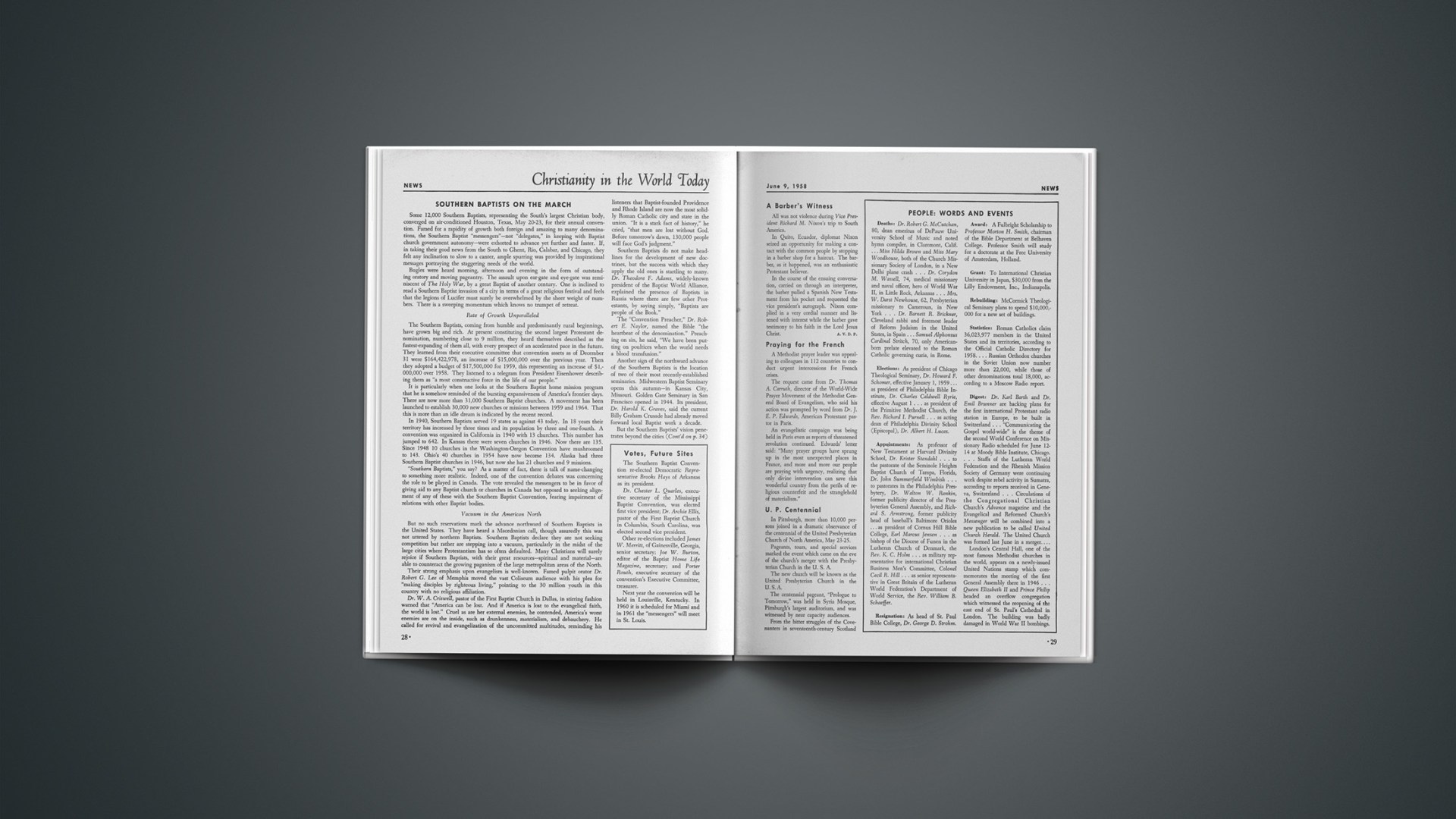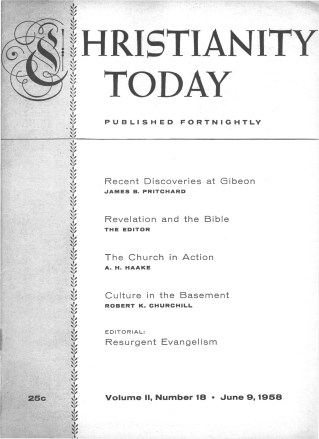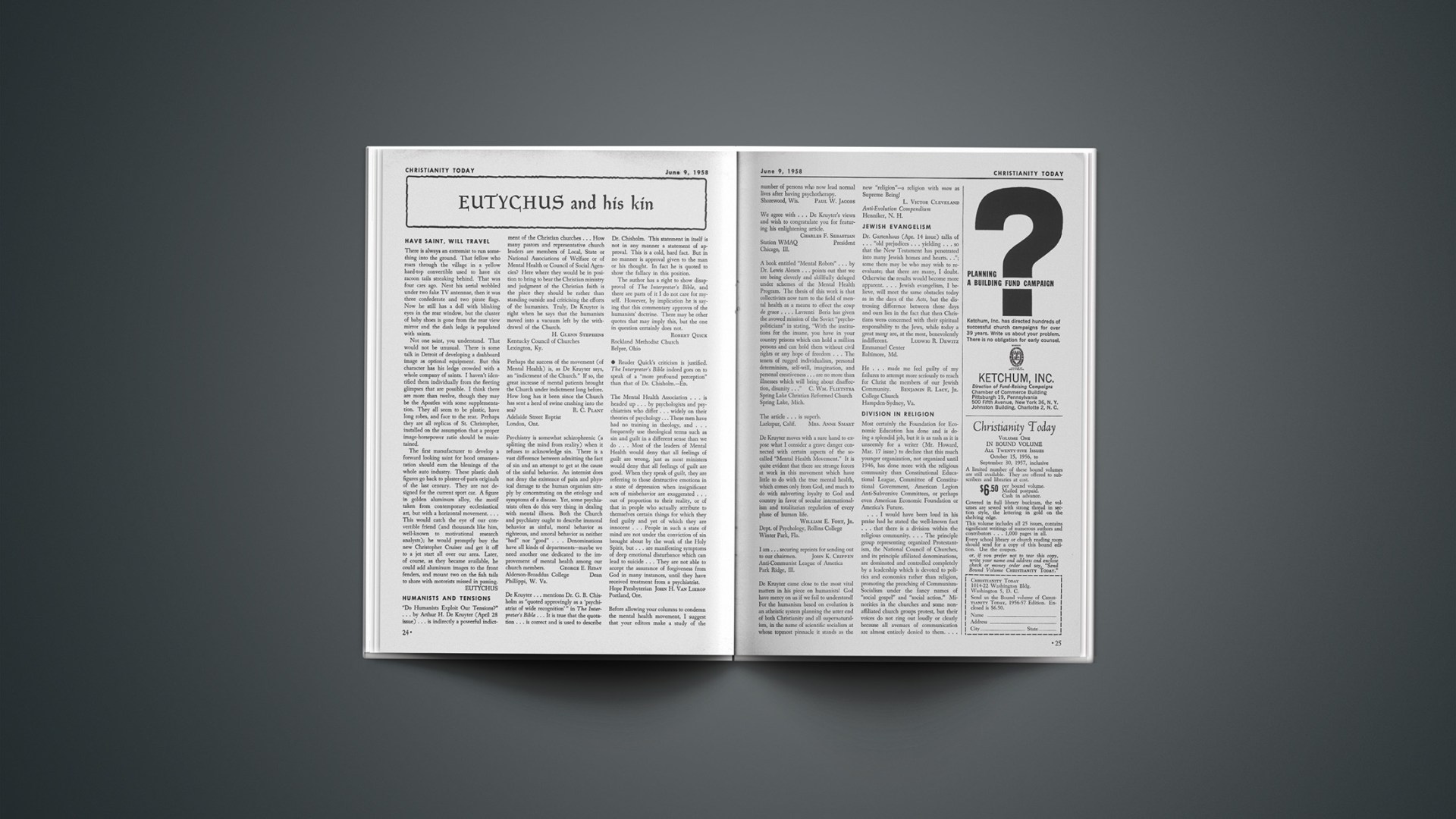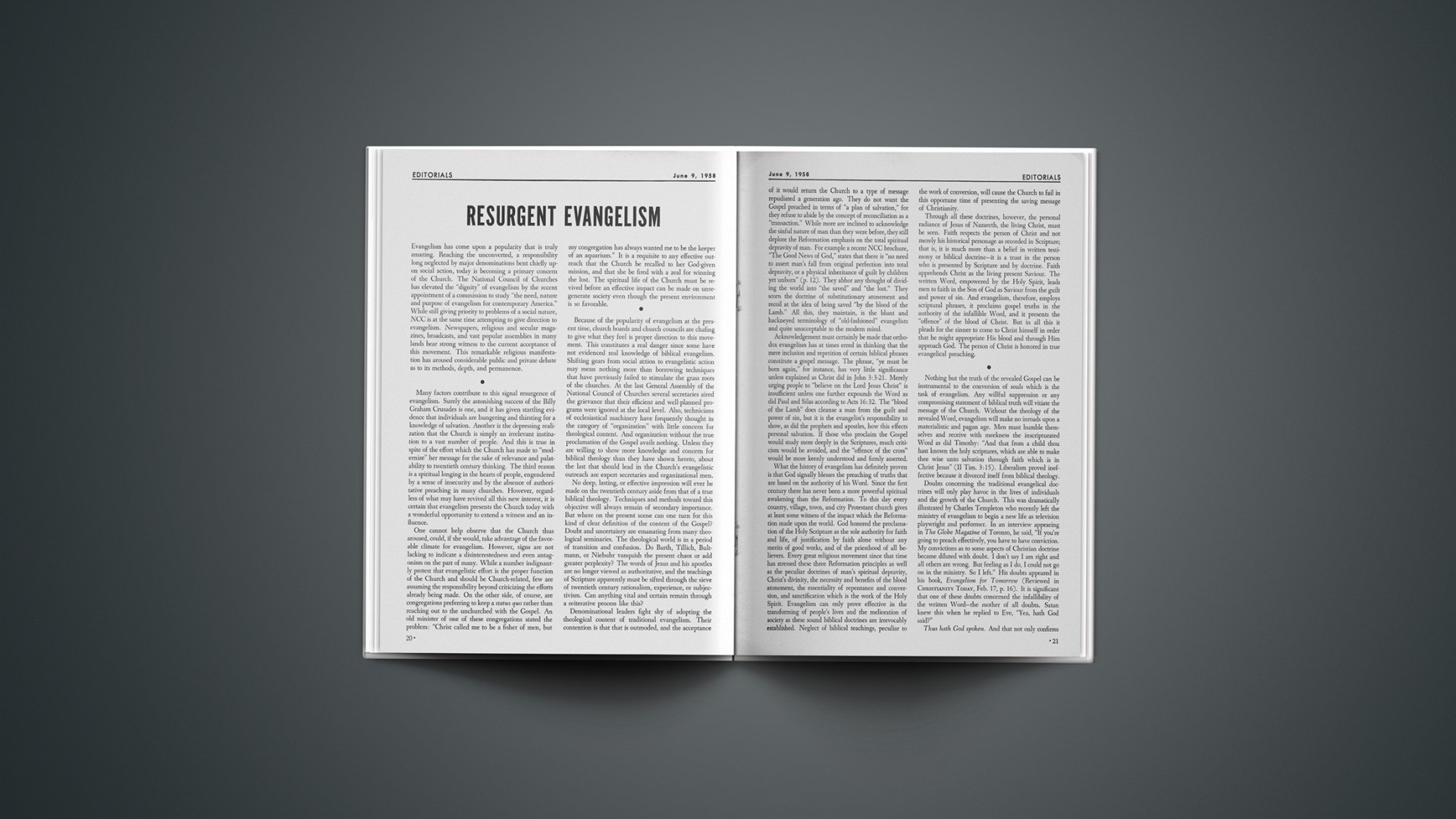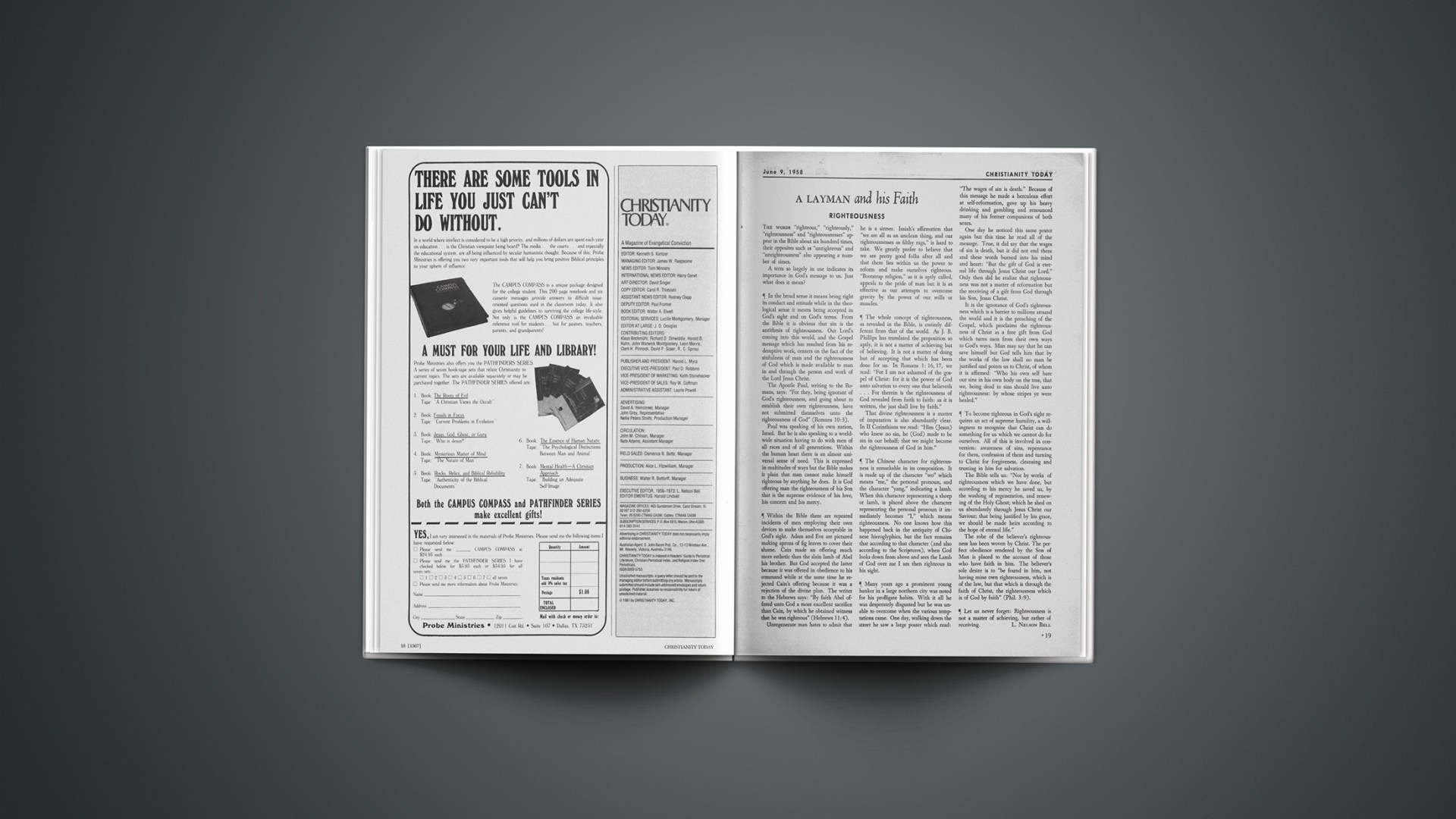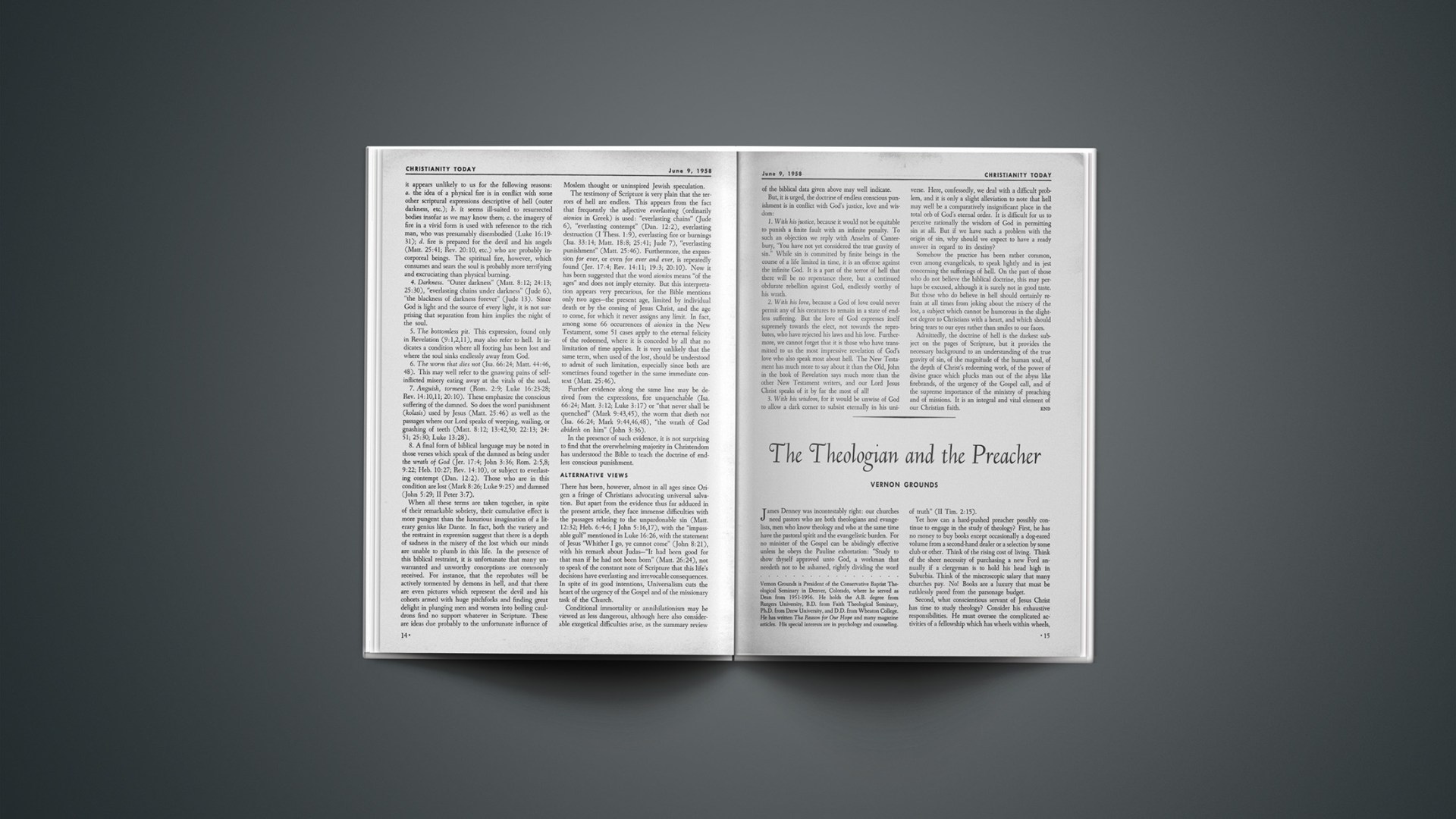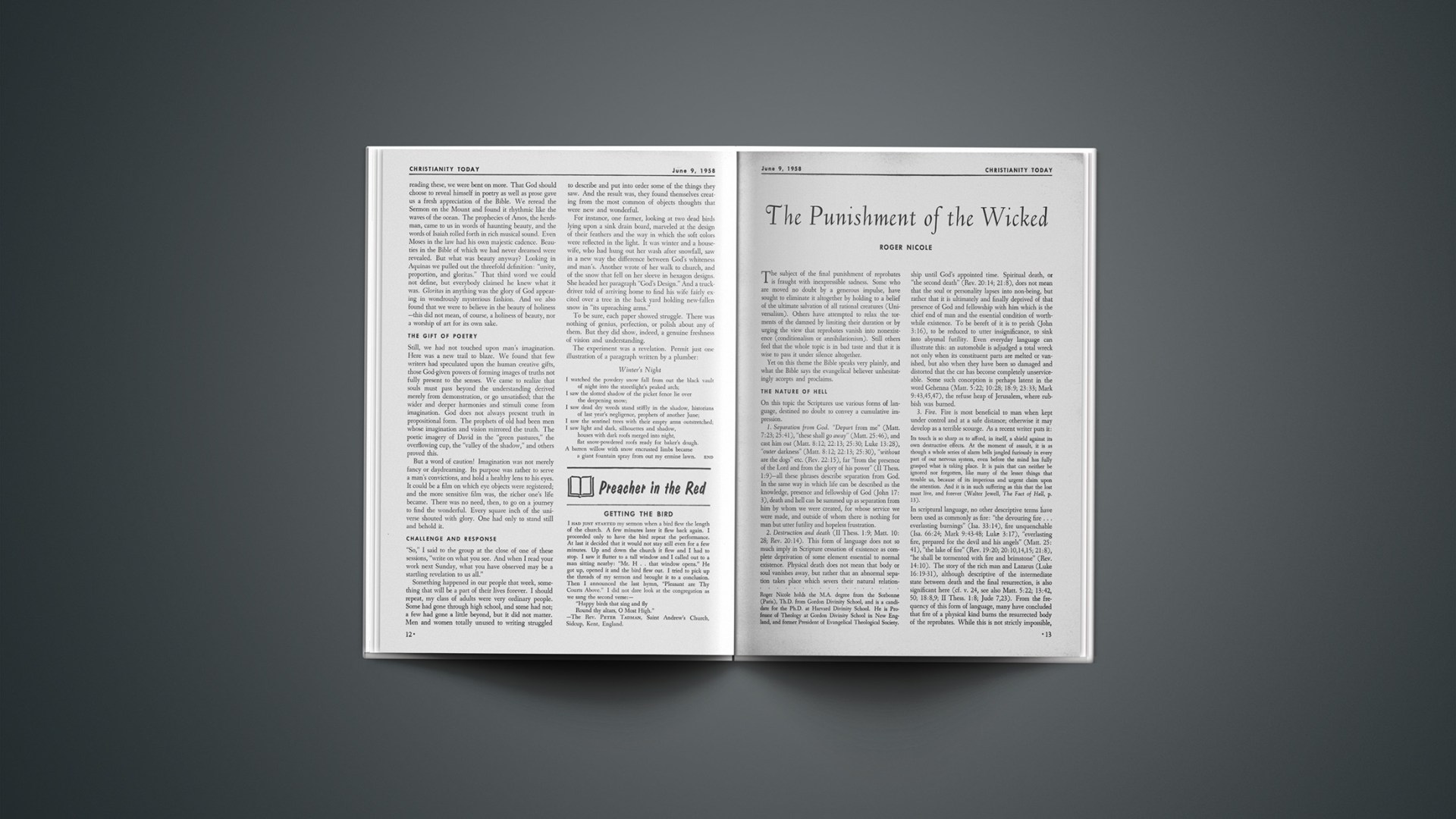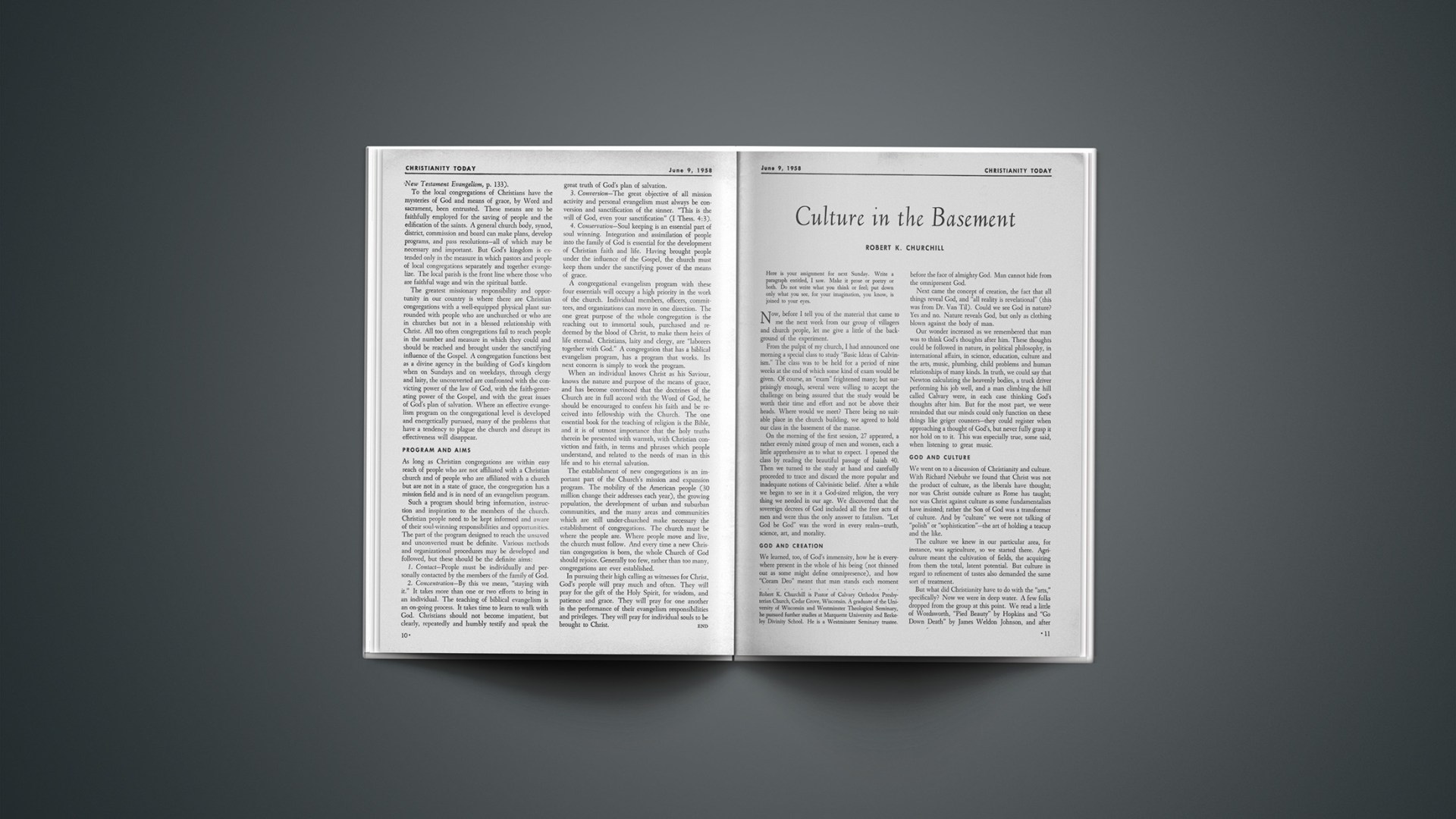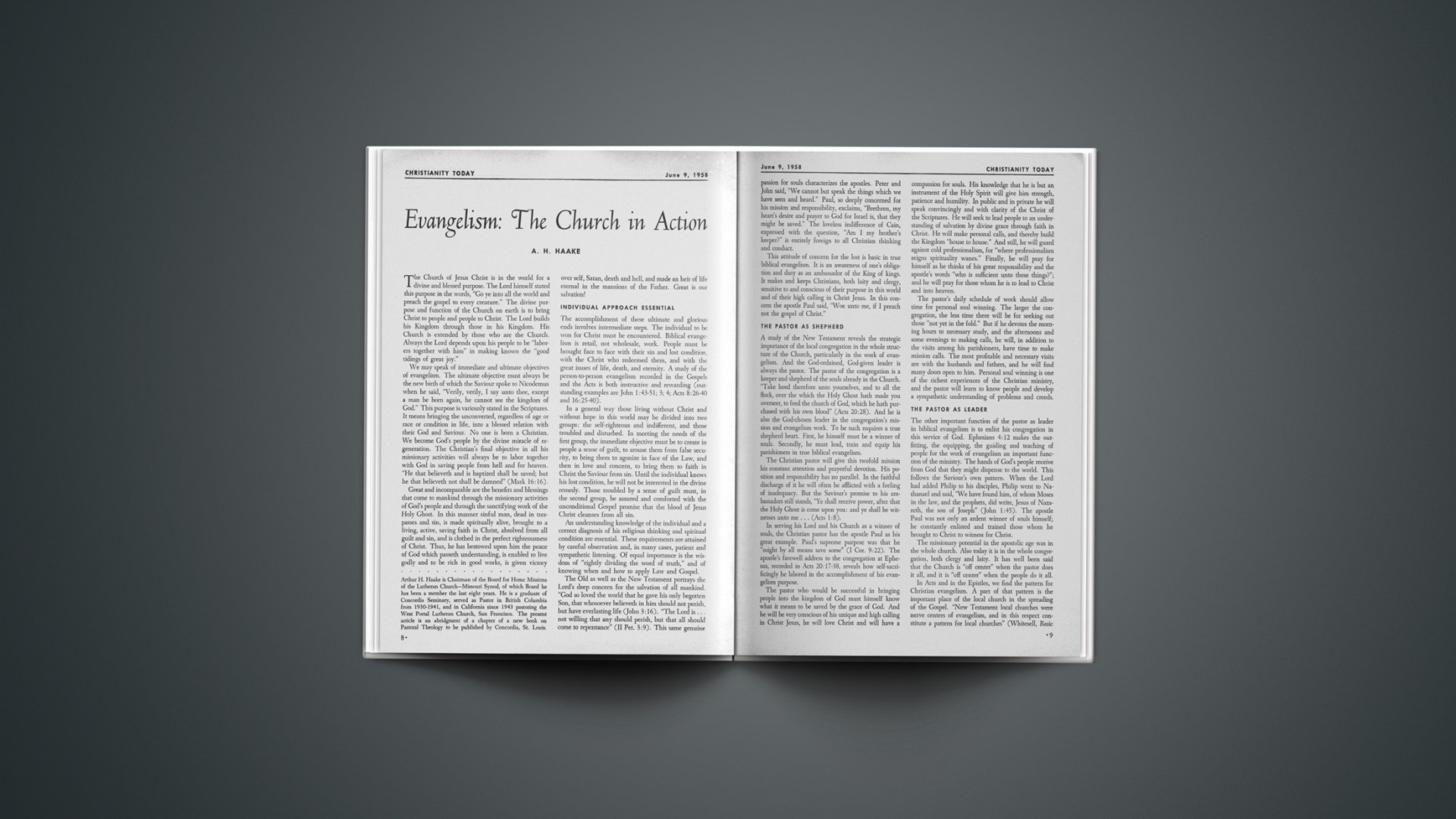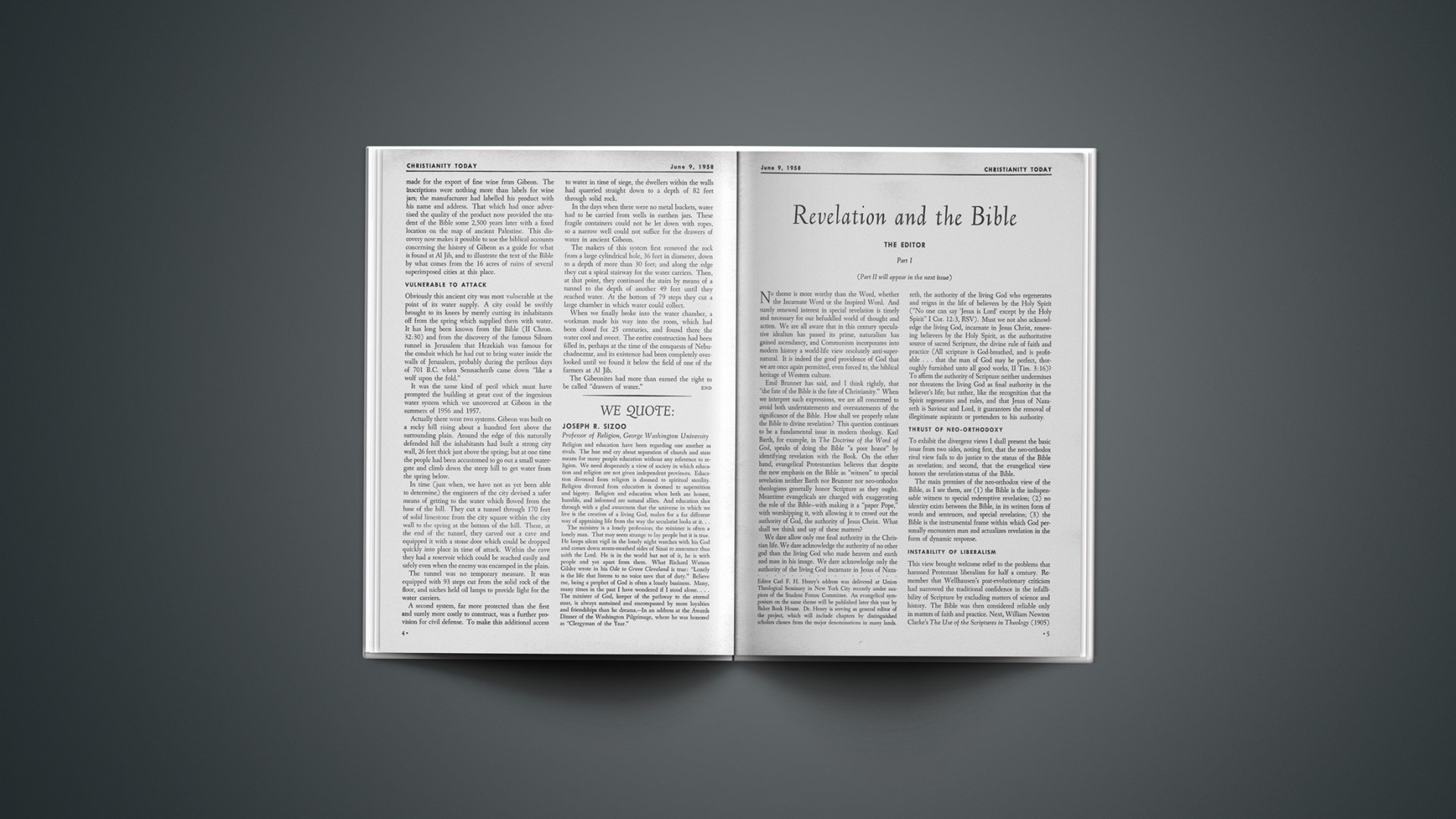NEWS
Christianity in the World Today
Some 12,000 Southern Baptists, representing the South’s largest Christian body, converged on air-conditioned Houston, Texas, May 20–23, for their annual convention. Famed for a rapidity of growth both foreign and amazing to many denominations, the Southern Baptist “messengers”—not “delegates,” in keeping with Baptist church government autonomy—were exhorted to advance yet further and faster. If, in taking their good news from the South to Ghent, Rio, Calabar, and Chicago, they felt any inclination to slow to a canter, ample spurring was provided by inspirational messages portraying the staggering needs of the world.
Bugles were heard morning, afternoon and evening in the form of outstanding oratory and moving pageantry. The assault upon ear-gate and eye-gate was reminiscent of The Holy War, by a great Baptist of another century. One is inclined to read a Southern Baptist invasion of a city in terms of a great religious festival and feels that the legions of Lucifer must surely be overwhelmed by the sheer weight of numbers. There is a sweeping momentum which knows no trumpet of retreat.
Rate Of Growth Unparalleled
The Southern Baptists, coming from humble and predominantly rural beginnings, have grown big and rich. At present constituting the second largest Protestant denomination, numbering close to 9 million, they heard themselves described as the fastest-expanding of them all, with every prospect of an accelerated pace in the future. They learned from their executive committee that convention assets as of December 31 were $164,422,978, an increase of $15,000,000 over the previous year. Then they adopted a budget of $17,500,000 for 1959, this representing an increase of $1,000,000 over 1958. They listened to a telegram from President Eisenhower describing them as “a most constructive force in the life of our people.”
It is particularly when one looks at the Southern Baptist home mission program that he is somehow reminded of the bursting expansiveness of America’s frontier days. There are now more than 31,000 Southern Baptist churches. A movement has been launched to establish 30,000 new churches or missions between 1959 and 1964. That this is more than an idle dream is indicated by the recent record.
In 1940, Southern Baptists served 19 states as against 43 today. In 18 years their territory has increased by three times and its population by three and one-fourth. A convention was organized in California in 1940 with 13 churches. This number has jumped to 642. In Kansas there were seven churches in 1946. Now there are 135. Since 1948 10 churches in the Washington-Oregon Convention have mushroomed to 143. Ohio’s 40 churches in 1954 have now become 134. Alaska had three Southern Baptist churches in 1946, but now she has 21 churches and 9 missions.
“Southern Baptists,” you say? As a matter of fact, there is talk of name-changing to something more realistic. Indeed, one of the convention debates was concerning the role to be played in Canada. The vote revealed the messengers to be in favor of giving aid to any Baptist church or churches in Canada but opposed to seeking alignment of any of these with the Southern Baptist Convention, fearing impairment of relations with other Baptist bodies.
Vacuum In The American North
But no such reservations mark the advance northward of Southern Baptists in the United States. They have heard a Macedonian call, though assuredly this was not uttered by northern Baptists. Southern Baptists declare they are not seeking competition but rather are stepping into a vacuum, particularly in the midst of the large cities where Protestantism has so often defaulted. Many Christians will surely rejoice if Southern Baptists, with their great resources—spiritual and material—are able to counteract the growing paganism of the large metropolitan areas of the North.
Their strong emphasis upon evangelism is well-known. Famed pulpit orator Dr. Robert G. Lee of Memphis moved the vast Coliseum audience with his plea for “making disciples by righteous living,” pointing to the 30 million youth in this country with no religious affiliation.
Dr. W. A. Criswell, pastor of the First Baptist Church in Dallas, in stirring fashion warned that “America can be lost. And if America is lost to the evangelical faith, the world is lost.” Cruel as are her external enemies, he contended, America’s worst enemies are on the inside, such as drunkenness, materialism, and debauchery. He called for revival and evangelization of the uncommitted multitudes, reminding his listeners that Baptist-founded Providence and Rhode Island are now the most solidly Roman Catholic city and state in the union. “It is a stark fact of history,” he cried, “that men are lost without God. Before tomorrow’s dawn, 130,000 people will face God’s judgment.”
Southern Baptists do not make headlines for the development of new doctrines, but the success with which they apply the old ones is startling to many. Dr. Theodore F. Adams, widely-known president of the Baptist World Alliance, explained the presence of Baptists in Russia where there are few other Protestants, by saying simply, “Baptists are people of the Book.”
The “Convention Preacher,” Dr. Robert E. Naylor, named the Bible “the heartbeat of the denomination.” Preaching on sin, he said, “We have been putting on poultices when the world needs a blood transfusion.”
Another sign of the northward advance of the Southern Baptists is the location of two of their most recently-established seminaries. Midwestern Baptist Seminary opens this autumn—in Kansas City, Missouri. Golden Gate Seminary in San Francisco opened in 1944. Its president, Dr. Harold K. Graves, said the current Billy Graham Crusade had already moved forward local Baptist work a decade.
Votes, Future Sites
The Southern Baptist Convention re-elected Democratic Representative Brooks Hays of Arkansas as its president.
Dr. Chester L. Quarles, executive secretary of the Mississippi Baptist Convention, was elected first vice president; Dr. Archie Ellis, pastor of the First Baptist Church in Columbia, South Carolina, was elected second vice president.
Other re-elections included James W. Merritt, of Gainesville, Georgia, senior secretary; Joe W. Burton, editor of the Baptist Home Life Magazine, secretary; and Porter Routh, executive secretary of the convention’s Executive Committee, treasurer.
Next year the convention will be held in Louisville, Kentucky. In 1960 it is scheduled for Miami and in 1961 the “messengers” will meet in St. Louis.
But the Southern Baptists’ vision penetrates beyond the cities of the North. For the better part of an evening the foreign mission challenge was made strongly to the messengers. The Rev. James D. Belote of Hong Kong spoke of a “Sin Curtain” separating men from God. Given the degree of sacrifices many communists are making for their cause, he envisioned a Christian missionary advance “as yet undreamed of.”
Foreign Mission Board Executive Secretary Baker J. Cauthen expressed gratitude for the 1200 missionaries on the field but called for double that number, saying that the time had come for a new rocket-like thrust. He then led in a 20-minute prayer service.
An international vision was the burden of many of the remarks of Congressman Brooks Hays, who was re-elected president of the convention for the customary second term. He called election to this office the greatest honor he had ever received, noting he had learned his first lessons on democracy in a Baptist church as a lad. He told of his recent trip to the Soviet Union and of his speaking in a Baptist church in Moscow, where he contradicted to the congregation Marx’s axiom that religion is the opiate of the people.
Calling for “open doors” between America and Russia, the congressman declared his hope for “massive reconciliation” (this not compromising determent through arms) through “heart power, a passionate concern for humanity.” Toward this end he led in setting up a nine-man committee, including himself and Senator Albert Gore of Tennessee, to explore ways in which Southern Baptists can contribute to the promotion of world peace through “Christian love and the application of Christian principles to human affairs.” The international organization and contacts available through the Foreign Mission Board would be at the disposal of the committee.
The few road blocks in the way of the convention’s sweeping advance were quickly vaulted. The specter, by now painfully familiar, of integration-segregation controversy made its appearance. Adams had challenged the ministers in plain terms, pointing out the anomalous situation which found mission field converts unwelcome in the churches which had set out to convert them. Hays had supported the convention’s Christian Life Commission, saying, “It would be tragic for us to assume that we can function as a Christian body without assigning to trusted representatives of the convention the task of pointing out our Christian duty with respect to social evils and current conflicts.” Not only had the commission spoken out against obscene literature and alcoholic beverages, but it had also said that each citizen should “help and not hinder the progress of justice for all peoples.” Furthermore, “he must challenge the threat to the public school system” and also seek the “restoration of communication and fellowship with people of every race and nationality.”
Up rose the Rev. Montague Cook of Georgia who quoted Webster in seeking to demonstrate that “fellowship” is synonymous with “integration.” He held that the report should not be received until the local churches had expressed themselves, for newspapers might give the public the idea that the convention favored integration. Hays pointed out that no local church was bound by the report, and the vote was subsequently heavily in favor of receiving it.
A motion was later made that the commission return a grant of $15,000 from the Ford Foundation through the Fund for the Republic, on grounds of a purported congressional investigation. The motion was defeated by a large majority.
Newsmen sat up late one night in a hotel lobby awaiting an important verdict by the trustees of Southern Baptist Seminary, Louisville, Kentucky. Thirteen faculty members had threatened to resign over what they claimed was arbitrary control of the school’s program on the part of the administration. A party close to the situation claimed that the president, Dr. Duke K. McCall, believed the seminary should reflect the views of the denomination, while the dissidents felt the seminary should be at liberty to lead the denomination. The verdict, when it finally came after long deliberation, was unambiguous. The trustees came down solidly on the side of the president. The next move belonged to the dissenters.
One of the more important items of convention business was consideration of the report of the Survey Committee. Significance lessened, however, when some of the key items were returned for a further year’s study. The aim of the recommendations was said to be a slight structural tightening for the better co-ordination of the convention’s many activities. However, the sections dealing with the powerful Home Mission Board, which were deferred a year, would have transferred power from the board to the state conventions.
In effect, the Southern Baptists stand as an island of resistance in a great sea of increasing centralization in any and all areas of life. The Rev. Ralph Herring, while pointing out that certain missionary and other needs are such as to require more than the ability of a local body of believers, emphasized that the local body always has “prior claim” upon its members’ loyalties.
Thus, Southern Baptists affirm that the autonomy of each local church is a “major factor” in their not being a part of the National or World Council of Churches. The convention simply cannot commit its cooperating churches in such a matter.
The convention has been criticized for its size and crowded agenda, and thus its “machine-like efficiency,” with most of the business being handled by committees. It is at present undergoing self-examination on these matters.
Cooperation of Southern Baptists with other Baptists is seen in its very active participation in the Baptist World Alliance, in the Baptist Joint Committee on Public Affairs in Washington, D. C., and in a six-year program of preparation for the Baptist Jubilee of 1964.
Dr. Clarence W. Cranford, president of the American Baptist Convention and a member of the Southern Baptist Convention as well, addressed the Houston convention on the spiritual tie which binds all Baptists.
Another area of cooperation among 20 million Baptists in seven major North American bodies is a program of national revival centering about the Southern Baptist television series—the cooperative program to be called “Televangelism.”
As the convention rolled toward its conclusion, messengers discovered yet more achievements and heard yet more challenges. A two-volume Encyclopedia of Southern Baptists had been published earlier in the year. The Chaplains Commission reported that all active duty quotas in all branches of the services had been filled. The Sunday School Board announced that it had grossed over 23 million dollars in 1957. Its headquarters are in Nashville, a city second only to Washington, D. C. in the amount of second class mail handled. The biggest customers are the Baptists.
Adams said, “Atomic power is nothing compared to the power exploded from Calvary.” The Rev. Mr. Herring said, “We are here with the resources of the Gospel to make of the barriers of this world bridges over which Christ may enter the hearts of men.” A Texas voice said, “Tomorrow is a big day.”
A bugle was heard. And it was not taps.
F. F.
A Barber’S Witness
All was not violence during Vice President Richard M. Nixon’s trip to South America.
In Quito, Ecuador, diplomat Nixon seized an opportunity for making a contact with the common people by stopping in a barber shop for a haircut. The barber, as it happened, was an enthusiastic Protestant believer.
In the course of the ensuing conversation, carried on through an interpreter, the barber pulled a Spanish New Testament from his pocket and requested the vice president’s autograph. Nixon complied in a very cordial manner and listened with interest while the barber gave testimony to his faith in the Lord Jesus Christ.
A. V. D. P.
Praying For The French
A Methodist prayer leader was appealing to colleagues in 112 countries to conduct urgent intercessions for French crises.
The request came from Dr. Thomas A. Carruth, director of the World-Wide Prayer Movement of the Methodist General Board of Evangelism, who said his action was prompted by word from Dr. J. E.P. Edwards, American Protestant pastor in Paris.
An evangelistic campaign was being held in Paris even as reports of threatened revolution continued. Edwards’ letter said: “Many prayer groups have sprung up in the most unexpected places in France, and more and more our people are praying with urgency, realizing that only divine intervention can save this wonderful country from the perils of religious counterfeit and the stranglehold of materialism.”
U. P. Centennial
In Pittsburgh, more than 10,000 persons joined in a dramatic observance of the centennial of the United Presbyterian Church of North America, May 23–25.
Pageants, tours, and special services marked the event which came on the eve of the church’s merger with the Presbyterian Church in the U. S. A.
The new church will be known as the United Presbyterian Church in the U.S.A.
The centennial pageant, “Prologue to Tomorrow,” was held in Syria Mosque, Pittsburgh’s largest auditorium, and was witnessed by near capacity audiences.
People: Words And Events
Deaths: Dr. Robert G. McCutchan, 80, dean emeritus of DePauw University School of Music and noted hymn compiler, in Claremont, Calif.… Miss Hilda Brown and Miss Mary Woodhouse, both of the Church Missionary Society of London, in a New Delhi plane crash … Dr. Corydon M. Wassell, 74, medical missionary and naval officer, hero of World War II, in Little Rock, Arkansas … Mrs. W. Darst Newhouse, 62, Presbyterian missionary to Cameroun, in New York … Dr. Barnett R. Brickner, Cleveland rabbi and foremost leader of Reform Judaism in the United States, in Spain … Samuel Alphonsus Cardinal Stritch, 70, only American-born prelate elevated to the Roman Catholic governing curia, in Rome.
Elections: As president of Chicago Theological Seminary, Dr. Howard F. Schomer, effective January 1, 1959 … as president of Philadelphia Bible Institute, Dr. Charles Caldwell Ryrie, effective August 1 … as president of the Primitive Methodist Church, the Rev. Richard I. Purnell … as acting dean of Philadelphia Divinity School (Episcopal), Dr. Albert H. Lucas.
Appointments: As professor of New Testament at Harvard Divinity School, Dr. Krister Stendahl … to the pastorate of the Seminole Heights Baptist Church of Tampa, Florida, Dr. John Summerfield Wimbish … to pastorates in the Philadelphia Presbytery, Dr. Walton W. Rankin, former publicity director of the Presbyterian General Assembly, and Richard S. Armstrong, former publicity head of baseball’s Baltimore Orioles … as president of Cornus Hill Bible College, Earl Marcus Jensen … as bishop of the Diocese of Funen in the Lutheran Church of Denmark, the Rev. K. C. Holm … as military representative for international Christian Business Men’s Committee, Colonel Cecil R. Hill … as senior representative in Great Britain of the Lutheran World Federation’s Department of World Service, the Rev. William B. Schaeffer.
Resignation: As head of St. Paul Bible College, Dr. George D. Strohm.
Award: A Fulbright Scholarship to Professor Morton H. Smith, chairman of the Bible Department at Belhaven College. Professor Smith will study for a doctorate at the Free University of Amsterdam, Holland.
Grant: To International Christian University in Japan, $30,000 from the Lilly Endowment, Inc., Indianapolis.
Rebuilding: McCormick Theological Seminary plans to spend $10,000,000 for a new set of buildings.
Statistics: Roman Catholics claim 36,023,977 members in the United States and its territories, according to the Official Catholic Directory for 1958.… Russian Orthodox churches in the Soviet Union now number more than 22,000, while those of other denominations total 18,000, according to a Moscow Radio report.
Digest: Dr. Karl Barth and Dr. Emil Brunner are backing plans for the first international Protestant radio station in Europe, to be built in Switzerland … “Communicating the Gospel world-wide” is the theme of the second World Conference on Missionary Radio scheduled for June 12–14 at Moody Bible Institute, Chicago.… Staffs of the Lutheran World Federation and the Rhenish Mission Society of Germany were continuing work despite rebel activity in Sumatra, according to reports received in Geneva, Switzerland … Circulations of the Congregational Christian Church’s Advance magazine and the Evangelical and Reformed Church’s Messenger will be combined into a new publication to be called United Church Herald. The United Church was formed last June in a merger.…
London’s Central Hall, one of the most famous Methodist churches in the world, appears on a newly-issued United Nations stamp which commemorates the meeting of the first General Assembly there in 1946 … Queen Elizabeth II and Prince Philip headed an overflow congregation which witnessed the reopening of the east end of St. Paul’s Cathedral in London. The building was badly damaged in World War II bombings.
From the bitter struggles of the Covenanters in seventeenth-century Scotland through the General Assembly of 1858 in Pittsburgh which formed the United Presbyterian Church and the General Assembly of 1958, when yet another major union was to be consummated, the pageant traced Presbyterian history.
The play was written by Paul Gamble and directed by the Rev. Kenneth E. Grice. Dozens of persons took part.
Major Work
Leading evangelical scholars are preparing a new exposition of the English Bible in five volumes. Tentatively titled The Living Theme of the Great Book, the major work is scheduled for publication in 1960 by A. J. Holman Company.
Dr. Carl F. H. Henry, editor of CHRISTIANITY TODAY, is listed as consulting editor for the Bible exposition project which will have 65 contributors, among them scholars from Europe, Africa and Australasia. At least a dozen major denominations are represented.
In addition to outlines and expositions of each Bible book, the volumes will contain introductory essays by Wilbur M. Smith, F. F. Bruce, Oswald T. Allis, Andrew W. Blackwood, Everett F. Harrison, Julius R. Mantey, Francis I. Steele, and J. Kenneth Grider.
A Minister’S Return
The Rev. John Gerberding, who resigned as pastor of Holy Cross Lutheran Church near Milwaukee in 1955 after being acquitted on heresy charges, returned to the ministry last month by taking up the pastorate of the Epiphany Lutheran Church, Denver.
Asked whether his theological views had changed during the last four years, Pastor Gerberding replied, “I do not wish to comment on that.”
A Final Appeal
A church-state issue over the cut-rate sale of land to Fordham University was put in the hands of the United States Supreme Court last month.
A final appeal to the nation’s highest tribunal sought to reverse lower court rulings which refused to recognize the transfer of New York City property as any violation of church-state separation guarantees. Fordham, a Roman Catholic school, agreed to buy the land from the city at a price considerably less than the city paid for it. Plans called for redeveloping the area in New York’s Lincoln Square into campus grounds.
Charges have been made to the effect that transfer of the property under proposed terms would amount to an outright grant to Fordham.
Palace Progress
No one visiting the Cow Palace on a Thursday night could doubt that the Holy Spirit’s greatest work in the San Francisco Bay Cities Crusade is being done with young people. The seed of a new Christian commonwealth is being planted on the West Coast as thousands upon thousands of children of the atomic age continued to stream forward at the Billy Graham mass evangelistic campaign.
Out of the weird nihilism and moral anarchy of the “beat generation” are coming these youthful pilgrims, at the behest of a messenger who dares to liken their environment to that of Sodom and Gomorrah, and points them to the purity of Jesus Christ. The eagerness with which they respond is strangely stirring. A young prostitute telephoned from her brothel for help after a telecast. An eighth-grade girl “stood up” a sneak drinking date with boys the Saturday night after her decision. Duck-tailed young housebreakers and car-stealers are now thumbing painfully through the Gospel of John for the answers to “Lesson One: the Saviour and Eternal Life.”
Crusade momentum was felt in other ways, too. Pastors were astonished as decision cards began to choke their mailboxes. Some were delighted, others discomfited to find their church pillars had been “going forward.” Dr. Gilbert F. Close, pastor of San Francisco’s Portal-hurst Presbyterian Church and a consistent opponent of the campaign, acknowledged that he was “thrilled” when two students at San Francisco State College applied for membership in his church following their decisions. The Rev. Baldwin Sherman of Havenscourt Colonial Church, Oakland, cancelled choir rehearsals and told his people, “You’ll gain more by singing for Cliff Barrows.”
The unique telephone ministry that marked the New York Crusade is proving in San Francisco that it is a valid—if overlooked—arm of the Church. On May 19 it was extended to cover both sides of the bay. The nightly telecast had hardly flashed the new number before all eight lines were ringing and counselors were answering, “Billy Graham Crusade—may I help you?” (One woman replied, “I don’t know whether you can or not; my husband just punched me on the nose and walked out of the house.”) Chairman Don Lehmann, pastor of San Francisco’s Glad Tidings Temple, says that one out of every three calling in is making a clear commitment to Christ, and is being referred to a pastor and followed up. The telephone counselors use a non-directive technique, referring to the Scriptures after first clarifying the inquirer’s thoughts by restating his expressed feelings.
The nation-wide Saturday night telecasts were bringing thousands of letters telling of conversions. Twelve Canadian stations joined the network until virtually every metropolitan area in North America was covered.
On the surface, the city by the Golden Gate seemed its old gay, insouciant self. Police reported no lessening of the crime rate or the number of arrests. Bartenders around the Visitacion Valley area were said to be complaining, but elsewhere “business” was as usual. The city wore no sackcloth, and its only ashes were those of the 1906 earthquake and fire, still piled behind the Cow Palace.
Yet there was no doubt that things were happening. God was at work. San Francisco’s peripheral population is far smaller than either London or New York, yet the Cow Palace is averaging 5,000 per night more than Harringay, and a greater number were coming forward than at Madison Square Garden, according to Crusade Director Walter H. Smyth.
Dr. Graham’s fire and zeal are seeming inexhaustible. He has greatly expanded his ministry to include daytime addresses at the leading seminaries and universities, mass meetings in downtown San Francisco and Oakland, talks to overflow crowds at service clubs where he received standing ovations, and before the American Red Cross national convention. He testified before a legislative committee investigating indecent literature, “America needs a moral bath and a spiritual awakening,” and declared that California is the heart of the nude photo industry.
A memorable visit was paid to San Quentin Penitentiary, where Dr. Graham told four thousand convicts, “You are all spiritually on death’s row awaiting execution.” Six hundred of them responded to his challenge to live for Jesus Christ behind bars.
And each night he has returned to the Cow Palace to preach a gospel of sin and forgiveness in simple Anglo-Saxon phrases of great force. “So amazing is God’s love,” he told the vast assemblage, “that he erases your sins from his mind as a tape recorder erases its sound track.” Then follows the invitation, and as hundreds of inquirers make the long trek to the front, counselors appear as if by magic to stand alongside. Together they move to the counseling room where the straight and narrow path begins.
A cook from Florida, who jumped bail after being arrested for passing worthless checks, repented at the Cow Palace and then turned himself over to the FBI. He has gone back to face sentence. A woman alcoholic came forward to make her decision, then presented herself at her pastor’s study next day and demanded that he give her something to do. A pastor found tears in the eyes of his bus driver on the trip home and led him to confess his faith in Christ. A 22-year-old man, with scabs on his wrists from a suicide attempt, was heading for a bar and a bridge leap when he followed the crowd into the Cow Palace out of curiosity. He made his commitment in the counseling room and began attending crusade meetings regularly.
Since the meetings began the crusade has been singularly free from criticism. City officials have been friendly. Meanwhile, plans were being shaped for a gigantic visitation evangelism program June 23–26, with 10,000 laymen participating all over the bay area under the auspices of the crusade. If Billy Graham and his team have done nothing more than create a spiritual appetite and a hunger for God among the residents of the West Coast, they have already rendered a memorable service.
S. E. W.
Garden Glow
A spirit of evangelism still glows in New York. Seventeen thousand persons filed into Madison Square Garden on the cool, wet evening of May 15 for a rally marking the first anniversary of the start of Billy Graham’s campaign a year ago. The rally was sponsored by the Protestant Council of the City of New York, which also promoted last summer’s great New York Crusade. The group is planning still another Garden evangelistic meeting on Reformation Day, October 30.
The first anniversary rally had a nostalgic air about it. In a brief recorded message, Graham called on New Yorkers to carry the message of Christ to “thousands of people that are suffering from a thousand different problems.”
“Evangelism is not optional,” he said, “it is an obligation. We should all be engaged in evangelism.”
Principal speaker was the Rev. Joseph Blinco, Methodist evangelist from England and a member of Graham’s team, who asserted that “the good old days” had nothing on the present age.
Evangelist Blinco said we live in times “as dramatic and decisive as ever the Exodus was … (intellectually and philosophically) as dynamic as ever the Renaissance was … and (religiously) as potent as the Reformation.”
Blinco, who attended Cliff College in England and has been an evangelist ever since, wore the clerical white collar and gray suit. When he extended the “second chance” invitation, 128 stepped forward. Following the pattern of a Graham meeting, all were led to an inquiry room for counsel. During his address to the congregation, the evangelist asked how many present had made a decision for Christ the year before during the New York campaign. An estimated 6,000 stood. Last summer’s 61,000 inquirers all received follow-up counsel, according to a report by the Rev. Dan M. Potter, executive director of the Protestant Council, largest interdenominational church group serving Greater New York. Potter said that a visitation program, moreover, had added 1,000 persons to church rolls since the New York Crusade.
How valuable was Graham’s great evangelistic effort in behalf of the nation’s largest city? For lack of an adequate human unit to measure spiritual progress, a number of the evangelist’s opponents have used statistics as a basis for continuing criticism. “Little lasting effect” is a charge used to attack his policies. “Decision totals exaggerated” is another.
Even if the accusations were true, one irrefutable conclusion appears in all of Graham’s crusades: at least some inquirers are genuinely converted, and it is very likely that others are moved to make a decision for Christ even though they do not respond to public invitations. It is with this in mind that Graham asks:
“How many need to be converted before we rejoice?”
This is not to say that he disregards follow-up. Under commission from the Graham team, Dr. Robert O. Ferm, Houghton College dean of students, has been interviewing New York pastors and inquirers for months. He observes that a great majority of those who signed decision cards still affirm their decision.
(High School Evangelism Fellowship of New York reports continuing effects of the Billy Graham Crusade among teenagers. The group has inaugurated a quarterly publication which features in the first issue reports of follow-up work.)
Potter’s report, given as a rally preliminary, listed other evangelism-correlated efforts being carried out by the Protestant Council. He urged New York churches to hold more summer vacation Bible schools and to maintain full summer programs as deterrents to juvenile delinquency. He said the council will intensify its own services to youth during the summer. The group sponsors nine youth centers and helps young people find seasonal jobs.
Other rally preliminaries focused on the 2,000-voice choir led by Jab Williams. At 7:20 p.m. the strains of “How Great Thou Art” filled the Garden, unmistakenly reminiscent of Graham meetings. The choir also sang “Blessed Assurance” and “To God Be the Glory,” the latter title appearing on a banner strung on the edge of a tier overlooking the choir. Choir director Williams, who had assisted Cliff Barrows as music director, made the sign. He is a commercial artist.
Jerome Hines and his Metropolitan Opera company presented a moving Last Supper operatic dramatization. Congregational singing was under the direction of the Rev. Albert Gates. A Salvation Army band presented a pre-rally sacred concert. Miss Ethel Waters also sang. Chairman of the rally was the Rev. Ralph C. Drisko.
Counsellors for the inquirers had been rounded up from crusade mailing lists. So were choir members and ushers.
Love From Hate
Bombings prompted by racial hatred evoked an expression of indignation from the ministerial alliance of Jacksonville, Florida, which issued this statement:
“Any difference, however trivial and needless, is always worsened and aggravated with hate and suspicion, by violence and brutal disregard of the rights of others. The bombing of the James Weldon Johnson Junior High School and the Jacksonville Jewish Center, and the threatened bombing of the Jacksonville Labor Temple, are tragic and deplorable.
“To ignore them or tacitly accept them as the unavoidable accompaniment of disagreements and differences which confront us is to encourage a tendency and a train of thought which can carry us back to the barbaric jungle of human existence where the stronger and more vicious is the ruler.
“It is to be hoped and prayed that the violent, regrettable acts and threats of the past few days represent the isolated thoughtless violence of a few misguided people who will be brought back to saner thoughts and more responsible behavior by seeing what frightening and undesirable results can flow from such actions.”
The bombings may even have had an inadvertent effect for good. Resulting discussions may well bring about more sympathetic attitudes toward the people who were targets of the bombs.
R. K. M.
Exit Addenda
The Navy says it will not allow any more religious medals to accompany Vanguard rockets into space.
A St. Christopher medal was attached to the second stage of a three-stage Vanguard rocket which succeeded in putting the Navy’s first satellite into orbit.
The Navy advised Protestants and Other Americans United last month that steps have been taken “to prevent future similar departures from the universal scientific nature of the Vanguard project.”
Goal: 1,000 Missionaries
The Christian and Missionary Alliance will seek to increase the number of its missionaries serving overseas to 1,000 before the end of 1960. The society now has 822 on 22 mission fields.
The goal was announced by Dr. H. L. Turner at the group’s 61st annual General Council, held in Winnipeg.
South America
A Contact Lost?
The first Auca man to trust American missionaries is reported dead.
The death of the Ecuadorian Indian tribesman, who befriended five missionaries subsequently martyred, was reported by Elisabeth Elliot, wife of one of those slain. He had been dubbed “George.”
Mrs. Elliot is studying the Auca language with two tribeswomen who escaped the jungles last November. She is the author of Through Gates of Splendor and Shadow of the Almighty: The Life and Testament of Jim Elliot, which will be published by Harper and Brothers.
Meanwhile, a Roman Catholic doctor from Montreal had not been heard from for three months after entering the Auca jungle.
England
Cms And Independence
Talk of “missionary imperialism” in West African history is so much nonsense, Canon Max Warren implied in his general secretary’s report to the 159th annual meeting of the Church Missionary Society in London.
Fifty years before Nigeria was under Britain to any appreciable extent, Warren said, CMS was preparing Africans for independence.
“That is both spiritually and politically a fact of some importance,” he said, “that the celebration last autumn of the Centenary of the Niger Mission was, together with much else, the celebration of an act of missionary statesmanship.”
In his presidential address, Sir Kenneth Grubb said it was clear that the services of missions would be requested by the churches of the greater part of Africa “for many years to come.”
Many American mission leaders seem to be still suffering from the shock of China, Grubb added, and unable to envisage much beyond a fairly abrupt termination of their work.
“We of this society do not share these misgivings,” he said. “We have abundant evidence of the genuine and earnest demand made … for our cooperation.”
Africa
The Warfare
Islamic penetration into the cultural and religious life of Nigeria is causing considerable Christian concern.
An Islamic mission plans to establish a new Arabic college while another Nigerian school now offers a course on Islamic thought and culture. Demands are growing for a deeper understanding of Islam because of its impact on West Africa.
Vatican Radio last month said a “veritable race” is taking place in Africa between Christianity and Islam.
However, the Anglican bishop of Lagos said that with Nigeria’s independence in the offing, no useful purpose could be served by Christians and Muslims attacking each other. The Rt. Rev. A. W. Howells told the 13th Synod of the Lagos Diocese that everything possible would be done to arrange exchanges of views on Islam and Christianity.
J. L. J.
Middle East
Israeli Drought
A severe spring drought forced cattle raisers in the Negev area of southern Israel to move flocks because of dried-out pastures. Crops were also damaged.
One report, which called the drought one of the most severe in many years, said that the roadsides out of Jerusalem have been dotted by flocks of sheep and goats turned out to forage on badly-burned grain.
However, an Israel Embassy spokesman in Washington said the lack of rain was not considered a “major” emergency.
The spokesman said damage from droughts has been declining in recent years with the advent of more and improved irrigation systems.
A Step For Prestige?
“Integration” moves by Arab Presbyterians may help American Presbyterian missionaries regain lost prestige in Lebanon and Syria.
National Presbyterian synods in the two Middle Eastern countries are expected to take formal action next month on plans to “merge” with U. S. missions.
The actions would amount to dissolution of the American missions in favor of a national Christian organization, though abandonment is not intended. Missionaries from the United States will continue in present posts as “fraternal workers” under the direction of the national church. Similar moves have been made in India, Thailand, and French Cameroun, in keeping with Presbyterian aims to strengthen national churches by turning over to them the organizations and institutions which hitherto have been entirely controlled by Americans.
In some instances, the “integration” has led to enlargement of established work and appointment of additional personnel from the United States.
Presbyterian U.S.A. observers see increased influence among American missionaries when they no longer represent a foreign agency but a national Christian organization.
In Iran, similar plans have been in the offing for some time. The Iranian Evangelical Church, as far back as 1936, began to assume responsibility for mission projects when the government prohibited foreign-operated grade schools to enroll Iranian children. Mission schools in three cities were taken over by the church and now are expanding. Full indigenization of the Iran Mission has been delayed primarily because of the relative paucity of national leadership and the steady drain on church membership by the emigration of Assyrian and Armenian families.
F. T. W.
[Some missionary boards and missionaries seriously question “integration,” feeling that the inclusion of missionary personnel in the national church and the turning over of mission funds to the national church is a distinct step away from the strengthening of an indigenous church. On many mission fields the national church has been developed and strengthened without either of the above mentioned steps. In some instances nationals have been encouraged by missionaries to demand the integration of the missionaries into their churches, along with subsidation from abroad, only to regret their impetuosity in the light of the effect on the national church.—ED.

